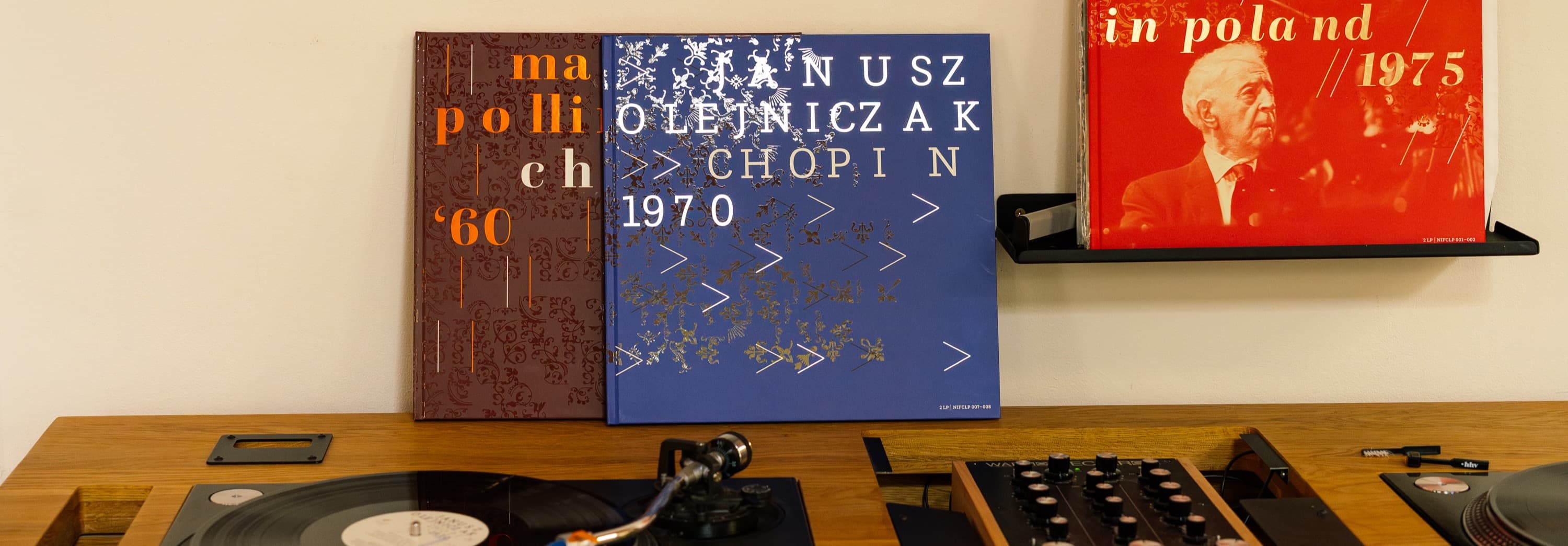NEWS
The magic of vinyl

In 2025, during the 19th edition of the Chopin Competition and on the eve of its centennial celebrations, the Fryderyk Chopin Institute begins publishing a new, extraordinary phonographic series – on vinyl, featuring the highest sound quality and beautiful artwork. The series opens with recordings of competition performances by Maurizio Pollini and Janusz Olejniczak, as well as the last concert given in Poland by Artur Rubinstein.
***
The sixth edition of the Chopin Competition in 1960 clearly established the international standing of the event – to what significantly contributed the fact that the jury, under the honorary chairmanship of Artur Rubinstein, awarded First Prize to a non-Slavic pianist for the first time. Victory went to the phenomenal Maurizio Pollini, who utterly outclassed his competitors. Years later, technically perfect, stylistically impeccable, noble, and elegant, he captivated audiences with a wide repertoire ranging from Bach to the Italian avant-garde of the 20th century. The opening album of the Chopin Institute’s newest phonographic series – historical vinyl recordings – presents gems of Pollini’s interpretations: the Impromptu in G-flat major, Op. 51, the Nocturne in C minor, Op. 48, No. 1, three preludes from Op. 28, two mazurkas (Op. 50, No. 3 and Op. 33, No. 2), the Polonaise in F-sharp minor, Op. 44, and the breathtaking Piano Concerto in E minor, Op. 11, during which the artist was accompanied by the Warsaw Philharmonic Orchestra under the baton of Jerzy Katlewicz.
***
Artur Rubinstein not only served as honorary patron of the 6th Competition but also performed at its inauguration (‘the memory of his concert,’ wrote Janusz Ekiert, ‘pervaded the atmosphere of the competition’). Fifteen years later, the legendary artist played in Poland for the last time – in May 1975 with the Łódź Philharmonic, conducted by Henryk Czyż.
That evening in Łódź, Rubinstein performed Chopin’s Piano Concerto in F minor and Beethoven’s ‘Emperor’ Concerto, and the bravura Polonaise in A flat major, Op. 53, as an encore.
Jed Distler wrote about the CD recording of this concert, published by the Chopin Institute in 2023: ‘That an 88-year-old pianist can summon the stamina to play two demanding concertos in one concert is impressive enough; yet it’s even more amazing that Rubinstein was still at close to the top of his form. Naturally there are tiny finger slips here and there, but they’re totally inconsequential in light of the veteran pianist’s gorgeous tone, full-bodied projection, naturally proportioned rubato, and communicative immediacy.’
The recording, released on vinyl, takes on the charm of this medium and seems to convey the almost tangible atmosphere of that concert by the incomparable maestro.
***
‘Janusz Olejniczak gained fame as one of Poland’s finest talents and has been acclaimed in many countries all over the world,’ Janusz Ekiert summarized in his concise publication on the history of the Chopin Competition in 2010. In the 8th edition (1970), the 18-year-old pianist (who celebrated his birthday just four days before the inauguration of the Competition!) took sixth place and became an undisputed audience favourite – admirers of his talent demonstrated their enthusiasm in various, even very unconventional, ways; among particularly original ideas was presenting the young Chopinist with a wire-haired fox terrier.
The album on vinyl contains Olejniczak’s most beautiful competition performances from the first and second rounds, as well as the final. It includes Nocturne in C minor, Op. 48 No. 1, Ballade in F major, three etudes (Op. 10 No. 8 and from Op. 25 – Nos. 3 and 10), Scherzo No. 1, Sonata No. 2, Mazurkas Op. 17, Polonaise in A-flat major Op. 53, and Piano Concerto No. 2.
Revealed in 1970, the great artist’s talent and unique playing style developed rapidly in the following years, and Olejniczak’s versatility allowed him to make a name for himself not only in broadly defined high culture – when, transcending classical music, he participated in projects involving jazz and folk music – but also in popular culture – particularly in film: he played Chopin in Andrzej Żuławski’s ‘La note bleue’ and recorded the soundtracks for Jerzy Antczak’s ‘Desire for Love’ and Roman Polański’s ‘The Pianist.’ The artist died unexpectedly in 2024, leaving behind a profound void – as a person and as one of the most outstanding pianistic individuals of the 20th and 21st centuries.